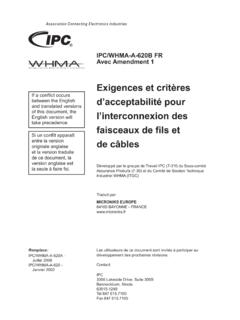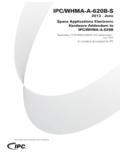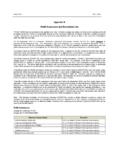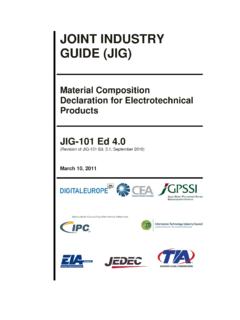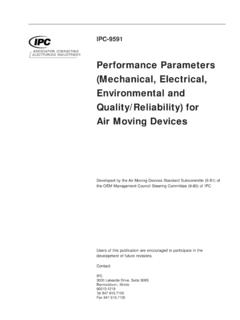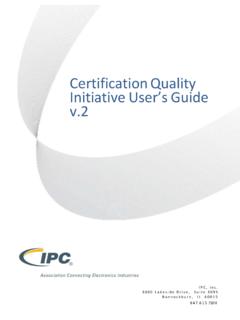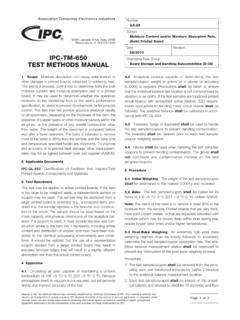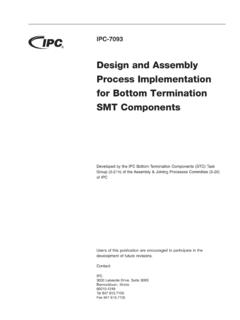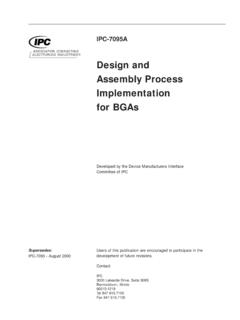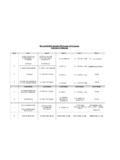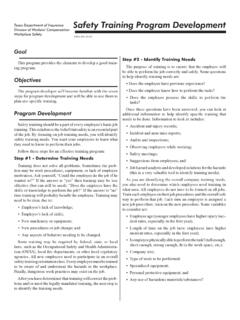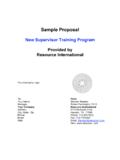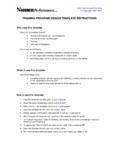Transcription of IPC Polcies and Procedure Manual (April 2017 …
1 IPC PROFESSIONAL training AND CERTIFICATION. policies AND procedures . Version 6 June 2017. 2017 by IPC International, Inc. All Rights Reserved. The effective date of this document is June 5, 2017. Course Material Ownership .. 10. Contents CIT Kits to Train 10. 1 BACKGROUND .. 2. 9 TESTING .. 11. 2 REGIONAL 2. CIT 12. 3 TERMS AND DEFINITIONS .. 2. CIS 12. 4 GOALS .. 3. CID/CID+ Retesting .. 13. 5 IPC PROFESSIONAL training AND. CIT Challenge Testing .. 13. CERTIFICATION PROGRAMS .. 3. Recertification .. 13. Certification Ownership .. 4. CIT Challenge Test Requirements .. 13. 6 training AND CERTIFICATION TEAM. CIS Challenge Testing .. 14. MEMBERS .. 4. Partially Completed Testing .. 14. IPC Certification Program Office .. 4. 10 DISTANCE LEARNING .. 14. IPC training and Certification Advisory CIT Lecture-Based Distance Learning .. 14. Committee .. 4. CIT Workmanship Skills Distance Technical training 5. Learning .. 15. Marketing Partners .. 5. CIS Lecture-Based Distance Learning.
2 15. MIT .. 5. CIS Workmanship Skills Distance CIT .. 6. Learning .. 15. CIS, CID and CID+.. 6. 11 FORMS AND DOCUMENTATION. 7 CERTIFICATION TERM .. 7. REQUIREMENTS .. 15. Certification Extension .. 7. training Reports .. 15. Recertification .. 8. Student 15. MIT Recertification Minimum Authorization to Reproduce 15. Requirement .. 8. Retention of Exams .. 16. CIT Recertification - Minimum Class Student Workmanship Examples .. 16. Presentation Requirement .. 8. 12 LIMITATION OF LIABILITY .. 16. Certificate Renewal Options .. 9. 13 APPEAL .. 16. 8 OBLIGATIONS OF 9. 14 REVISION TRACKING .. 16. Maximum Class Size .. 9. Required Course Materials .. 9. { / 1 }. 1 BACKGROUND. This Policy and procedures (P&P) document is applicable to IPC's Professional training and Certification Programs (hereinafter Programs ), including lecture-based discrimination-skills courses (IPC-A-600, IPC-A-610, IPC/WHMA-A-620, IPC- 6012 and Designer Certification). and courses that include workmanship skills demonstration (J-STD-001 and IPC-7711/7721).
3 The effective date of this P&P document is indicated in the cover page of this document, and these policies and procedures apply to any certification center master agreements in effect after that effective date, and any CIT and MIT agreements signed after that effective date. This policy document is subject to change without notice and therefore all MITs and CITs are required to visit the training and Certification portal at the webpage prior to each time a course is taught in order to review and confirm the most current P&P. document. Furthermore, all new certification program revisions will be designed and released with a separate module focused on policies and procedures . When available, all trainers will need to use the latest module when delivering a class so as to ensure that the latest policies are being taught within a given certification program. Questions regarding the program policies , procedures and application or requests for extension of Trainer certification should be directed to IPC Certification Program Office through the Certification Help Desk.
4 The help desk is linked from the Online Certification Portal ( ). IPC is the sole certificating authority for all Programs. IPC has the right and responsibility for maintenance of the Programs. IPC reserves the right to make changes to the requirements for certification to the Programs. Changes will be communicated by email, the IPC Websites, or by other formats. It is the responsibility of the program user to remain aware of updates to requirements and Programs. 2 REGIONAL RESTRICTIONS. There are unique requirements for any Licensed training Center or CIT or MIT that desires to conduct training in The People's Republic of China, India, Thailand, and Vietnam. Anyone who desires to conduct IPC training in any of these countries must obtain written permission from IPC before scheduling or conducting such IPC training . The foregoing provision overrides anything to the contrary in any master agreement or other agreement between IPC and any Licensed training Center, CIT or MIT.
5 3 TERMS AND DEFINITIONS. a) Licensed training Center or training Center: Any training center licensed by IPC. pursuant to the IPC Certification Center Master License Agreement or the IPC Private Certification Center Master License Agreement. There are two types of Licensed training Centers: a Public training Center and a Private training Center, as defined below. b) Public training Center: A Licensed training Center with the purpose of employing or contracting MITs to conduct publicly available CIT training courses. Page | 2 IPC Professional training and Certification policies and procedures v6. c) Private training Center: A Licensed training Center with the purpose of employing or contracting MITs to conduct training courses within a company or corporation. d) In-House training : 1. training conducted by a Private training Center within the Private training Center's branches, locations, or sites to certify employees of the training Center's owning company.
6 2. training contracted for and conducted by a Public training Center at a customer's location for that customer's employees only. e) Remote Administration: Monitoring or proctoring an exam by webcam, telephone, video camera, or other remote means wherein a proctor is not physically present in the room with the test-taker. f) Online Exam Format: 1. The Online Exams or Online Print Exams as presented through the Online Certification Portal used for the completion of the Programs. 2. Reporting the results of all Online Exams and Online Print Exams through the Online Certification Portal. g) MIT: Master IPC Trainer. An MIT provides training and certification to CIT, Design CIT, Design+ CIT, CIS, CID, or CID+. h) CIT: Certified IPC Trainer. A CIT provides training and certification to CIS, CID or CID+. i) CIS: Certified IPC Specialist j) CID: Certified Interconnect Designer k) CID+: Advanced Certified Interconnect Designer 4 GOALS. The goals of the IPC Professional training and Certification Programs are to: a) Deliver a standardized set of industry developed, recognized, approved and traceable training programs to enhance understanding and appropriate application of criteria in the standard(s).
7 Specific to each course of instruction. b) Provide an understanding of accept/reject criteria to enhance an individual's motivation and ability to consistently and correctly apply the criteria in the applicable standards. c) Teach methods and processes to help improve an individual's skills and ability to achieve acceptable workmanship. d) Communicate methods and techniques how to use, navigate, locate and to apply the criteria contained in the applicable standard(s) to the appropriate class or classes of production. 5 IPC PROFESSIONAL training AND CERTIFICATION PROGRAMS. The content of the Programs are developed by and through consensus of industry, including but not limited to members of IPC and many others such as representatives from academia, government agencies, original equipment manufacturers (OEM), electronic manufacturing service companies (EMS) and circuit board manufacturing companies, and are used worldwide. Participation in any Program is voluntary.
8 Membership in IPC is not required for use of any Program or for the use of any IPC Standard. However, IPC member companies enjoy discounts that non-members do not. training consistency and program integrity is maintained by establishing certification criteria and control on all levels of the program through industry Page | 3 IPC Professional training and Certification policies and procedures v6. consensus and the use of standardized training materials. All CITs and MITs are required to agree to these policies and procedures , and must indicate that agreement by e-signature when accessing the Online Certification Portal. Instructors are required to access the Certification Portal at and indicate by e-signature an understanding of, and agreement to the policies and procedures herein. Such e-signatures result in these policies and procedures becoming a matter of contract between IPC and the signing party. Certification Ownership The certification (IPC Certificate) is granted to each individual who successfully completes the training , not to the employer.
9 CIT, CIS or CID/CID+ Certification is a personal and portable credential. While it is appropriate for the employing company to have a copy of an individual's certificate for training and audit records, the original shall be issued to and retained by the certified individual. MITs and CITs are encouraged to provide each trained individual a copy of the certificate along with the original either in hard copy or electronic format. For companies wishing to protect their investments in those for whom they pay for training , IPC staff may be consulted regarding various successful methodologies that have worked toward this end. A CIT, CIS, or CID/CIT+ retains their certification even when changing employment (portable). 6 training AND CERTIFICATION TEAM MEMBERS. IPC Certification Program Office The IPC Certification Program Office consists of employees of IPC, including but not limited to the members of the IPC Certification Department. The IPC Certification Program Office is an IPC function responsible for: a) Approval and administration of training Center licenses.
10 B) Approval and administration of Program translation agreements. c) Facilitating Program development meetings. d) Periodic auditing of Licensed training Centers, MITs, and CITs to ensure compliance to the policies and procedures . e) Reproducing and distributing training material. f) Tracking Program participants. g) Providing policy interpretation and Program issue resolution. IPC training and Certification Advisory Committee The IPC training and Certification Advisory Committee is comprised of industry representatives of all parties active and interested in the purposes and operation of the Programs. This committee represents the user's interests for the Programs by advising the IPC Certification Program Office on Program policy, procedures , implementation and improvements. Page | 4 IPC Professional training and Certification policies and procedures v6. Technical training Committees Each Program has a unique Technical training Committee chaired by a representative of the IPC.
